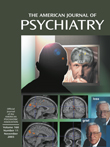The Utility of Mandatory Depression Screening of Dementia Patients in Nursing Homes
Abstract
OBJECTIVE: Current methods for enhancing the recognition and treatment of depression in nursing home patients have been unsuccessful. This study examines the process, outcome, and impact of instituting a mandatory depression screening program for depressed dementia patients in nursing homes. METHOD: The experimental and comparison groups each consisted of two nursing homes of 519 and 363 patients, respectively. Two of the experimental group and one of the comparison group homes were more traditionally staffed facilities; one of the comparison group homes had an enriched staff of psychologists. The Cornell Scale for Depression in Dementia was administered to the residents with dementia. In the experimental group, the patients who scored ≥5 were referred for psychiatric assessment. RESULTS: In the experimental group, 100% of the referred dementia patients who met screening criteria for depression were seen by a psychiatrist. This resulted in a significant increase in the percentage of individuals given antidepressants. This was greater than the percentage of patients receiving antidepressants in the “typical” comparison group home but not the “staff-enriched” comparison group home. White patients were significantly more likely to receive antidepressants; however, screening significantly increased the proportion of depressed nonwhites receiving antidepressants. At the 12-week follow-up, there was a significant difference in scores between patients receiving antidepressants in each group. CONCLUSIONS: Mandatory depression screening can significantly increase the proportion of depressed dementia patients receiving antidepressants, lead to dose adjustments, diminish potential ethnic biases in treatment, and affect the depressive symptoms of treated individuals.



